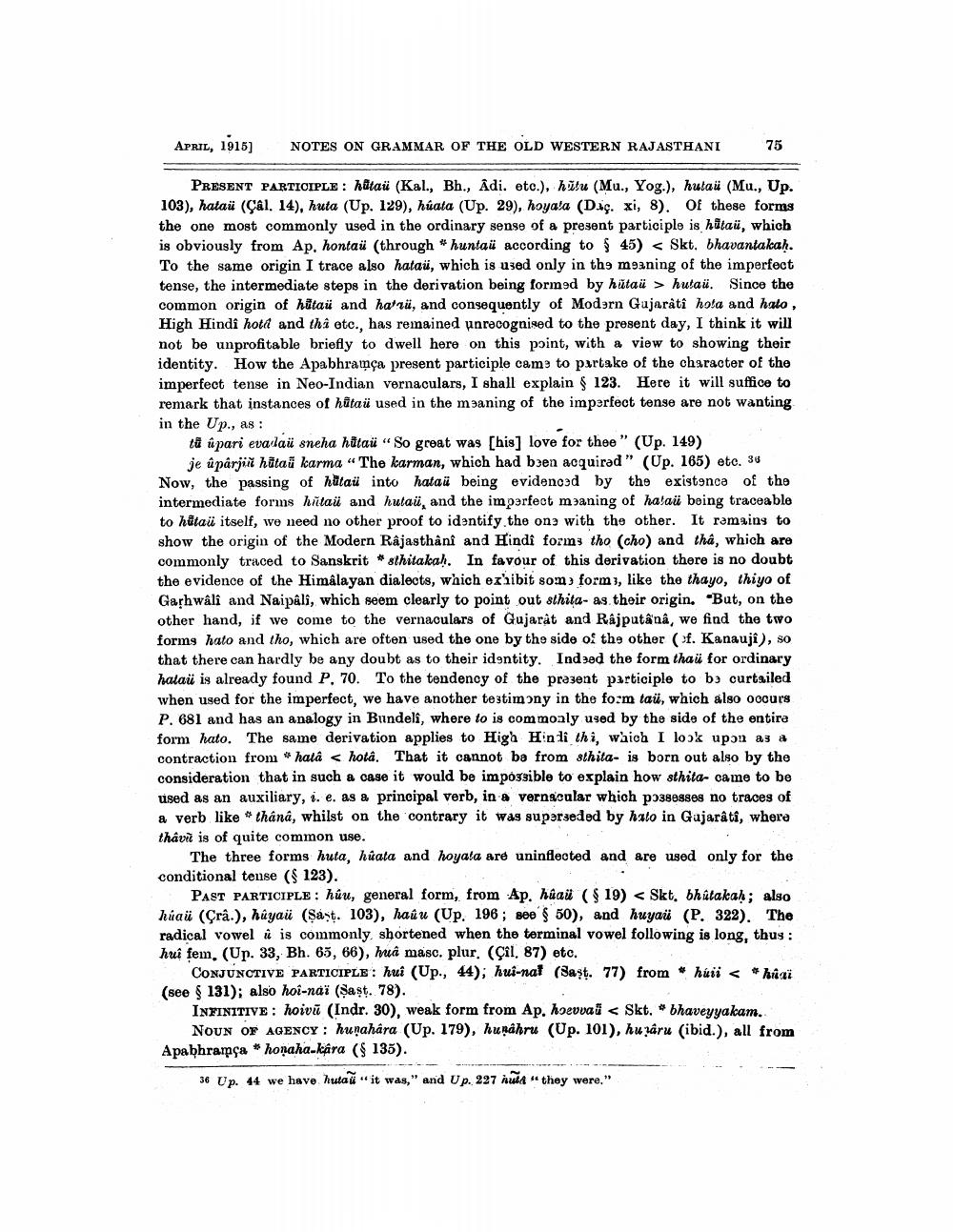________________
APRIL, 1915]
NOTES ON GRAMMAR OF THE OLD WESTERN RAJASTHANI
75
PRESENT PARTICIPLE : hitaü (Kal., Bh., Adi. etc.), hilu (Mu., Yog.), hutai (Mu., Up. 103), hataü (Çal. 14), huta (Up. 129), húata (Up. 29), hoyala (Dac. xi, 8). Of these forms the one most commonly used in the ordinary sense of a present participle is hitai, which is obviously from Ap. hontaü (through #huntaü according to $45) < Skt. bhavantakah. To the same origin I trace also hatau, which is used only in the meaning of the imperfect tense, the intermediate steps in the derivation being formed by hütaü > hutai. Since the common origin of hūtai and hatrü, and consequently of Modern Gujarati hota and halo , High Hindi hota and thi etc., has remained unrecognised to the present day, I think it will not be unprofitable briefly to dwell here on this point, with a view to showing their identity. How the Apabhraiņça present participle came to partake of the character of the imperfect tense in Neo-Indian vernaculars, I shall explain 123. Here it will suffice to remark that instances of hataü used in the meaning of the imperfect tense are not wanting in the Up., as :
tû ûpari eva lai sneha hitai "So great was [his] love for thee" (Up. 149)
je û pârjiữ hūtai karma "The karman, which had ben acquirad" (Up. 165) etc. 30 Now, the passing of hütaü into hataü being evidenced by the existence of the intermediate forms hitai and hutaü, and the imperfect msaning of halaii being traceable to hūtai itself, we need no other proof to identify the one with the other. It remains to show the origin of the Modern Rajasthani and Hindi forms tho (cho) and tha, which are commonly traced to Sanskrit * sthitakah. In favour of this derivation there is no doubt the evidence of the Himalayan dialects, which exhibit som form , like the thayo, thiyo of Garhwali and Naipali, which seem clearly to point out sthita- as their origin. But, on the other hand, if we come to the vernaculars of Gujarat and Rajputânâ, we find the two forms hato and tho, which are often used the one by the side of the other (f. Kanauji), so that there can hardly be any doubt as to their identity. Indsed the form thaü for ordinary halaü is already found P. 70. To the tendency of the present participle to be curtailed when used for the imperfect, we have another testimony in the form taü, which also occurs P. 681 and has an analogy in Bundeli, where to is commonly used by the side of the entire form hato. The same derivation applies to High Hinli thi, which I look upon as a contraction from * hala s hota. That it cannot ba from sthita- is born out also by the consideration that in such a case it would be impossible to explain how sthita- came to be used as an auxiliary, i. e. as a principal verb, in a vernacular which p338888es no traces of a verb like thana, whilst on the contrary it was superseded by halo in Gujarati, where thava is of quite common use.
The three forms huta, hứata and hoyata are uninflected and are used only for the conditional tense (8 123).
PAST PARTICIPLE: hậu, general form, from Ap. hûai (19) < Skt. bhitakal; also húaü (Çra.), hûyaü (Şart. 103), hallu (Up. 196 ; see $ 50), and huyaii (P. 322). The radical vowel û is commonly shortened when the terminal vowel following is long, thus : hri fem. (Up. 33, Bh. 65, 66), huâ masc. plur. (Çil, 87) etc.
CONJUNCTIVE PARTICIPLE: hui (Up., 44); hui-nal (sast. 77) from * húii < *higi (see § 131); also hoi-naï (sast. 78).
INFINITIVE: hoivu (Indr. 30), weak form from Ap. hoevvai < Skt. " bhaveyyakam.
NOUN OF AGENCY : hunahára (Up. 179), hunahru (Up. 101), huráru (ibid.), all from Apabhrampça * honaha-kára ($ 135).
36 Up. 44 we have hutaü "it was," and Up. 227 nula "they were."




